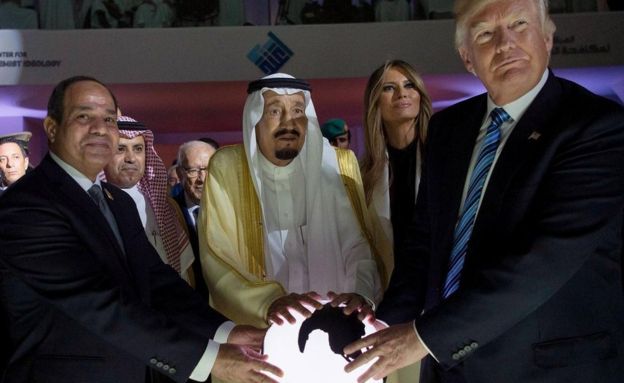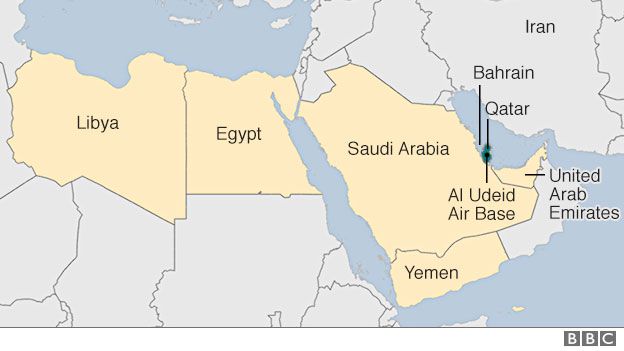 EPA
EPA
A number of Arab countries including Saudi Arabia and Egypt have cut diplomatic ties with Qatar, accusing it of destabilising the region.
They say Qatar backs militant groups including so-called Islamic State (IS) and al-Qaeda, which Qatar denies.
The Saudi state news agency SPA said Riyadh had closed its borders, severing land, sea and air contact with the tiny peninsula of oil-rich Qatar.
Qatar called the decision "unjustified" and with "no basis in fact".
The unprecedented move is seen as a major split between powerful Gulf countries, who are also close US allies.
It comes amid heightened tensions between Gulf countries and their near-neighbour, Iran. The Saudi statement accused Qatar of collaborating with "Iranian-backed terrorist groups" in its restive eastern region of Qatif and in Bahrain.
What has happened?
The diplomatic withdrawal was first put into motion by Bahrain, then Saudi Arabia, the United Arab Emirates (UAE), Egypt, Yemen, Libya's eastern-based government and the Maldives all followed suit.
SPA cited officials as saying the decision was taken to "protect its national security from the dangers of terrorism and extremism".
Saudi Arabia, the UAE and Bahrain have given all Qatari visitors and residents two weeks to leave their territory. The three countries have also banned their citizens from travelling to Qatar.
However, Saudi Arabia says it will still allow Qataris to take part in the annual Hajj pilgrimage to Mecca.
So far, there has been no sign of reciprocal moves by Qatar.
In the latest developments:
- The UAE and Egypt have given Qatari diplomats 48 hours to leave both countries
- Airlines from many of the affected countries, including EgyptAir, Etihad Airways and Emirates, said they are to cancel flights to and from the Qatari capital Doha
- The Gulf allies said they had closed their airspace to Qatar Airways, which has suspended all its flights to Saudi Arabia
- Bahrain's state news agency said it was cutting its ties because Qatar was "shaking the security and stability of Bahrain and meddling in its affairs"
- The Saudi-led Arab coalition fighting Yemen's Houthi rebels also expelled Qatar from its alliance because of its "practices that strengthen terrorism" and its support of extremist groups.
Why has this happened?

US President Trump met Egyptian President Sisi and Saudi King Salman in Saudi Arabia two weeks ago
While the severing of ties was sudden, it has not come out of the blue, as tensions have been building for years, and particularly in recent weeks.
Two weeks ago, Egypt, Saudi Arabia, Bahrain and the UAE blocked Qatari news sites, including Al Jazeera. Comments purportedly by Qatari Emir Sheikh Tamim bin Hamad al-Thani criticising Saudi Arabia had appeared on Qatari state media.
The government in Doha dismissed the comments as fake, attributing the report to a "shameful cybercrime".
Back in 2014, Saudi Arabia, Bahrain and the UAE withdrew their ambassadors from Qatar for several months in protest over alleged interference in their affairs.
More broadly, two key factors drove Monday's decision: Qatar's ties to Islamist groups, and the role of Iran, Saudi Arabia's regional rival.
While Qatar has joined the US coalition against IS, the Qatari government has repeatedly denied accusations from Iraq's Shia leaders that it provided financial support to IS.

Wealthy individuals in the emirate are believed to have made donations and the government has given money and weapons to hardline Islamist groups in Syria. Qatar is also accused of having links to a group formerly known as the Nusra Front, an al-Qaeda affiliate.
The SPA statement accused Qatar of backing these groups, as well as the Islamist Muslim Brotherhood - banned in Gulf countries as a terrorist organisation - and that it "promotes the message and schemes of these groups through their media constantly".
Saudi Arabia itself is a key backer of Islamist rebels, including hardline jihadist groups, in Syria.
No comments:
Post a Comment